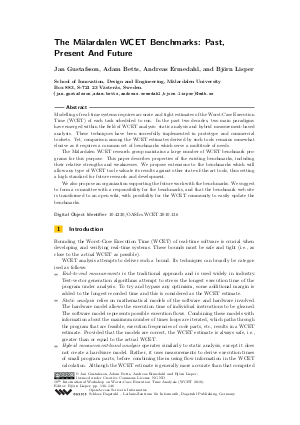The Mälardalen WCET Benchmarks: Past, Present And Future
Authors Jan Gustafsson, Adam Betts, Andreas Ermedahl, Björn Lisper
-
Part of:
Volume:
10th International Workshop on Worst-Case Execution Time Analysis (WCET 2010)
Part of: Series: Open Access Series in Informatics (OASIcs)
Part of: Conference: Workshop on Worst-Case Execution Time Analysis (WCET) - License:
 Creative Commons Attribution-NonCommercial-NoDerivs 3.0 Unported license
Creative Commons Attribution-NonCommercial-NoDerivs 3.0 Unported license
- Publication Date: 2010-11-26
File

PDF
OASIcs.WCET.2010.136.pdf
- Filesize: 460 kB
- 11 pages
Document Identifiers
Subject Classification
Keywords
- WCET analysis
- benchmark
Metrics
- Access Statistics
-
Total Accesses (updated on a weekly basis)
0Document
0Metadata
Abstract
Modelling of real-time systems requires accurate and tight estimates of the Worst-Case Execution Time (WCET) of each task scheduled to run. In the past two decades, two main paradigms have emerged within the field of WCET analysis: static analysis and hybrid measurement-based analysis. These techniques have been succesfully implemented in prototype and commercial toolsets. Yet, comparison among the WCET estimates derived by such tools remains somewhat elusive as it requires a common set of benchmarks which serve a multitude of needs. The Maelardalen WCET research group maintains a large number of WCET benchmark programs for this purpose. This paper describes properties of the existing benchmarks, including their relative strengths and weaknesses. We propose extensions to the benchmarks which will allow any type of WCET tool evaluate its results against other state-of-the-art tools, thus setting a high standard for future research and development. We also propose an organization supporting the future work with the benchmarks. We suggest to form a committee with a responsibility for the benchmarks, and that the benchmark web site is transformed to an open wiki, with possibility for the WCET community to easily update the benchmarks.
Cite As Get BibTex
Jan Gustafsson, Adam Betts, Andreas Ermedahl, and Björn Lisper. The Mälardalen WCET Benchmarks: Past, Present And Future. In 10th International Workshop on Worst-Case Execution Time Analysis (WCET 2010). Open Access Series in Informatics (OASIcs), Volume 15, pp. 136-146, Schloss Dagstuhl – Leibniz-Zentrum für Informatik (2010)
https://doi.org/10.4230/OASIcs.WCET.2010.136
BibTex
@InProceedings{gustafsson_et_al:OASIcs.WCET.2010.136,
author = {Gustafsson, Jan and Betts, Adam and Ermedahl, Andreas and Lisper, Bj\"{o}rn},
title = {{The M\"{a}lardalen WCET Benchmarks: Past, Present And Future}},
booktitle = {10th International Workshop on Worst-Case Execution Time Analysis (WCET 2010)},
pages = {136--146},
series = {Open Access Series in Informatics (OASIcs)},
ISBN = {978-3-939897-21-7},
ISSN = {2190-6807},
year = {2010},
volume = {15},
editor = {Lisper, Bj\"{o}rn},
publisher = {Schloss Dagstuhl -- Leibniz-Zentrum f{\"u}r Informatik},
address = {Dagstuhl, Germany},
URL = {https://drops.dagstuhl.de/entities/document/10.4230/OASIcs.WCET.2010.136},
URN = {urn:nbn:de:0030-drops-28336},
doi = {10.4230/OASIcs.WCET.2010.136},
annote = {Keywords: WCET analysis, benchmark}
}
